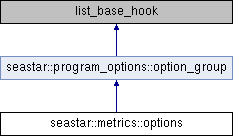Detailed Description
Metrics configuration options.
#include <seastar/core/metrics_api.hh>
Inheritance diagram for seastar::metrics::options:

Public Types | |
| using | value_list_type = boost::intrusive::list< basic_value, boost::intrusive::base_hook< list_base_hook >, boost::intrusive::constant_time_size< false > > |
| using | option_group_list_type = boost::intrusive::list< option_group, boost::intrusive::base_hook< list_base_hook >, boost::intrusive::constant_time_size< false > > |
Public Member Functions | |
| options (program_options::option_group *parent_group) | |
| operator bool () const | |
| Does the option group has any values contained in it? | |
| bool | used () const |
| const std::string & | name () const |
| const value_list_type & | values () const |
| value_list_type & | values () |
| void | describe (options_descriptor &descriptor) const |
| void | mutate (options_mutator &mutator) |
Public Attributes | |
| program_options::value< std::string > | metrics_hostname |
| The hostname used by the metrics. More... | |
Member Function Documentation
◆ describe()
|
inherited |
Describe the content of this option group to the visitor.
The content is visited in a depth-first manner:
- First the option groups itself is visited with options_descriptor::visit_group_start(). If this returns
falsethe entire content of the group, including all its subgroups and values are skipped and options_descriptor::visit_group_end() is called immediately. Otherwise visiting the content of the group proceeds. - All the values contained therein are visited. For each value the following happens:
- First options_descriptor::visit_value_metadata() is called with generic metadata that all values have. If this return
falsethe value is skipped, otherwise visiting the value proceeds. - Then the appropriate overload of options_descriptor::visit_value() is called, with a pointer to the default value of the respective value. The pointer is null if there is no default value.
- For selection_value, options_descriptor::visit_selection_value() will be called instead of options_descriptor::visit_value(). After the value is visited, the option_group instance belonging to each candidate (if set) will be visited.
- First options_descriptor::visit_value_metadata() is called with generic metadata that all values have. If this return
- All the nested option_group instances in the current group are visited.
- Finally options_descriptor::visit_group_end() is called.
◆ mutate()
|
inherited |
Mutate the content of this option group by the visitor.
The visiting algorithm is identical to that of describe(), with the following differences:
- options_mutator::visit_value() is allowed to mutate the value through the passed-in reference. It should return
trueif it did so andfalseotherwise. - When visiting a selection value, only the nested group belonging to the selected value is visited afterwards.
Member Data Documentation
◆ metrics_hostname
| program_options::value<std::string> seastar::metrics::options::metrics_hostname |
The hostname used by the metrics.
If not set, the local hostname will be used.
The documentation for this struct was generated from the following file:
- seastar/core/metrics_api.hh